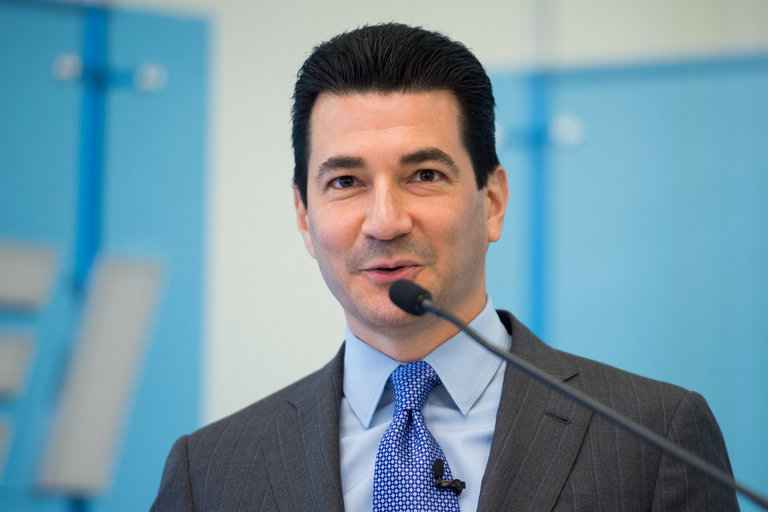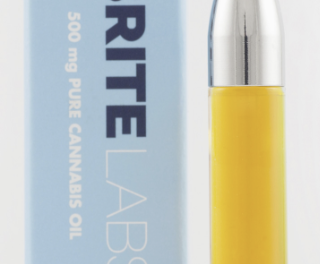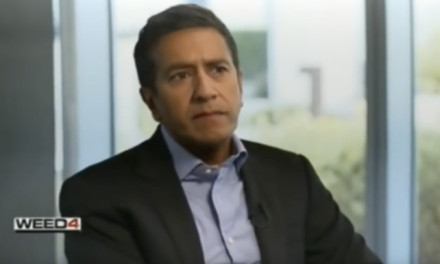GW Pharmaceuticals, Insys, and other companies seeking FDA approval for cannabinoid drugs must have breathed a sigh of relief when Trump chose Scott Gottleib, MD, to head the agency, instead of Jim O’Neill, a libertarian who was in the running. O’Neill may have ditched the agency’s proof-of-efficacy requirement. (It has only been since 1962, BTW, that the FDA has required drug companies to submit data proving the effectiveness of a new drug. Till then approval was based on evidence of safety.) O’Neill reportedly praised the idea of “letting the market decide” whether new drugs actually work.
About Scott Gottleib, Wikipedia tells us:
Prior to attending medical school, Gottlieb worked as a healthcare analyst at the investment bank Alex. Brown & Sons in Baltimore. He completed a residency in internal medicine at the Mount Sinai Medical Center in New York and is a graduate of the Icahn School of Medicine at Mount Sinai, where he received a medical degree, and of Wesleyan University, where he received a Bachelor’s degree in economics.
Here’s the news story by Katie Thomas in the New York Times March 10:
President Trump said Friday that he intended to nominate Scott Gottlieb, a partner at a venture capital fund with longstanding ties to the pharmaceutical and biotech industries, to lead the Food and Drug Administration.
The selection of Dr. Gottlieb, 44, who served as a top official at the agency during the administration of President George W. Bush, drew praise from industry executives, who had previously expressed concerns that another top contender, Jim O’Neill, held radical views that would have gutted standards for drug approval trials and testing.
“I think Scott is science-based, he’s patient-focused, he’s got strong management skills and he’s intellectually tough, so he will use all of that to make sure the F.D.A. and industry are all acting in the interests of patients,” said Dr. Leonard S. Schleifer, the chief executive of Regeneron Pharmaceuticals.
But Dr. Gottlieb’s experience also elicited sharp criticism from consumer advocates who said he is too deeply tied to the industry….
“He is basically entangled in an unprecedented web of ties to big pharma,” said Dr. Michael Carome, the director of the health research group at Public Citizen, the consumer organization. “He is someone who has been an industry shill and has spent most of his career dedicated to promoting the financial interests of pharmaceutical corporations.”
Mr. Trump has made no secret about his desire to overhaul the F.D.A.,telling a group of pharmaceutical executives in January that he planned to slash regulations and speed up drug approvals at the agency. During his speech to Congress last month, he returned to the issue and highlighted the story of a girl, Megan Crowley, with a rare disease and a treatment that her father helped bring to market.
“If we slash the restraints, not just at the F.D.A. but across our government, then we will be blessed with far more miracles just like Megan,” Mr. Trump said in the speech.
Dr. Gottlieb is a venture partner at New Enterprise Associates, where he focuses on health care investments, and is a resident fellow at the American Enterprise Institute, a conservative think tank. He held various jobs at the F.D.A. during Mr. Bush’s presidency, including serving as the deputy commissioner for medical and scientific affairs.
Dr. Gottlieb also has longstanding ties to the drug industry, serving as a consultant or board member for several companies, including GlaxoSmithKline and Vertex Pharmaceuticals. He received more than $400,000 in payments from pharmaceutical companies between 2013 and 2015, according to a federal database.
Since leaving the F.D.A. a decade ago, Dr. Gottlieb has been a prolific commentator on drug policy and his views are seen as more moderate than those of Mr. O’Neill, an associate of the billionaire tech investor Peter Thiel, who had supported bringing drugs to market even if it was not yet clear they worked.
The possibility that Mr. O’Neill might be the choice drew an unusually sharp rebuke from several leaders of small pharmaceutical and biotechnology companies, who traditionally have favored speeding up the process for which drugs are approved. They said weakening those standards could destabilize the market for pharmaceuticals and harm patients.
Daniel Carpenter, a professor at Harvard University who studies the F.D.A., described Dr. Gottlieb as “the least problematic of a very sorry pool of candidates.” But he said that if Dr. Gottlieb were confirmed, “he would be the most interest-conflicted commissioner in American history, by far.”
He added, “These are not relationships whose influence just disappears once he resigns from a corporate board. The Senate should scrutinize the conflicts of interest carefully.”
Indeed, Dr. Gottlieb was the clear choice of the pharmaceutical industry — when the Wall Street firm Mizuho Securities surveyed 53 drug companies in February, nearly three-quarters said they preferred him.
As a frequent contributor to news media organizations like Forbes and The Wall Street Journal, Dr. Gottlieb has urged the F.D.A. to move more quickly to approve treatments and said it can be too bureaucratic.
Although the agency has traditionally not become involved in the hot-button issue of drug pricing, Dr. Gottlieb has written that the agency could help reduce the price of old drugs that have lost their patent protection by loosening the rules governing generic drugs and streamlining the process for their approval.
Speeding up the generic approval process has been a favorite issue for Republicans: In February, House Republicans introduced a bill that would also streamline the process.
If confirmed, he would take over the agency at a time when even industry executives say the F.D.A. has gotten better at speeding necessary new drugs to market. Recent studies have shown that a majority of new drugs are approved through an expedited process, and a law passed last year would further accelerate the approval process.
While industry leaders say the agency still needs to do more, consumer advocates warn that the pendulum is tipping too far in favor of approving drugs and that the agency needs to do more to ensure that drugs that reach the market are safe.
Dr. Gottlieb would head a sprawling agency that oversees everything from drugs and medical devices to tobacco, food and cosmetics. Products regulated by the agency account for 20 cents of every dollar spent by American consumers each year.
“This is a vast agency with very important responsibilities, and does many things every day that matter for millions of Americans,” said Dr. Mark McClellan, the former F.D.A. commissioner during the Bush administration, who hired Dr. Gottlieb.
“I think he’s very well qualified for the job and would make an excellent commissioner,” he said.
John Taylor, a former F.D.A. lawyer who worked with Dr. Gottlieb during the Bush administration, said that Dr. Gottlieb’s views were more conservative than his but that he grew to admire his attention to detail and said he was open-minded.
“Scott and I have different ideological backgrounds, but I recognize that he does have a record of doing things that are for the benefit of the consumers,” he said.
Relevant background from O’Shaughnessy’s: “Is the FDA Worth Defending?”





